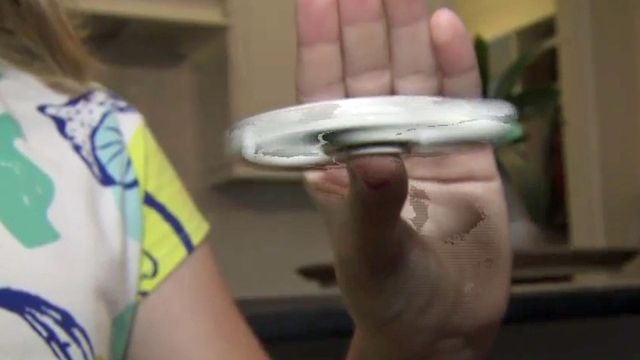Education expert: Setting rules can keep twirling toys from spinning out of control
Fidget spinners have been around for years, but it wasn't until this spring that the tiny twirling gadgets exploded in popularity. Now, they're everywhere, with adults and students alike getting in on the craze.
Posted — UpdatedNow, they're everywhere, with adults and students alike getting in on the craze.
"They're basically little things you can hold in your hands and spin," fidget spinner collector Finn Wallingford says.
Finn got his first spinner a few months ago, and now he and his sister, Jordan, are collectors.
"I did have two, but I have one right now," Finn said. "It was stolen by someone in my class."
And therein lies the rub on the latest craze. Some parents are now getting notes from frustrated teachers who say the toys are no longer allowed in their classrooms.
The Triangle's biggest school systems haven't yet developed any policies about them, but Finn's mom said she could understand why teachers wouldn't want to see them.
"Suddenly, it's not about you quietly spinning. It's you checking out what your neighbor is doing," Tracy Wallingford said.
Education consultant Kim Hughes said the spinners and their cousins, fidget cubes, have been around for "a really long time."
Hughes has been teaching for decades, and now she coaches teachers, parents and students.
She says she believes gadgets such as the spinners or cubes can help people focus.
There isn't any research specifically looking at whether the spinners help people who suffer with symptoms of Attention Deficit Hyperactivity Disorder, but Hughes says she believes they help.
"Their brains are wired a little bit differently. Allowing them to get up and move is really helpful in getting them to engage the thinking part of their brain at the highest level," Hughes said.
Hughes recommends that teachers and parents set up and enforce time limits for spinning.
"It's a teaching opportunity, to be able to say to educators and parents, there's a time and a place for this," Hughes said.
Jordan Wallingford agrees.
"Sometimes they help you focus because you need something to do with your hands so you can listen," she said. "Sometimes they're a distraction because you don't focus on what the teacher is saying. You just go, 'Look at my spinner!'"
Hughes also suggests that parents look into other ways to engage their children. She says it's important to reduce their screen time and get them outside pretending and playing.
• Credits
Copyright 2024 by Capitol Broadcasting Company. All rights reserved. This material may not be published, broadcast, rewritten or redistributed.






